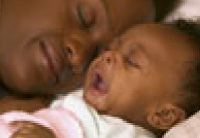The most common cause is enlargement of the tonsils and adenoids.
 Children who experience difficulty breathing while sleeping may have a serious medical condition. Snorting, gasping or irregular pauses associated with snoring may indicate obstructive sleep apnea. Sleeping troubles in children are connected with poor school performance and behavioral problems as well as irritability, increased aggressiveness, attention deficit hyperactivity disorder (ADHD), age-inappropriate bedwetting and morning headaches. It is not uncommon for some children to be misdiagnosed with ADHD when they actually suffer from obstructive sleep apnea. Sleep testing is the only way accurately to diagnose whether the child is suffering from primary snoring or obstructive sleep apnea. The most common reason for sleep apnea and snoring in children is enlargement of the tonsils and adenoids. These tissues in the back of the throat and nose respectively can enlarge and mechanically block the airway. Our physician will use a special mirror, endoscope or x-ray to visualize the adenoids.
Children who experience difficulty breathing while sleeping may have a serious medical condition. Snorting, gasping or irregular pauses associated with snoring may indicate obstructive sleep apnea. Sleeping troubles in children are connected with poor school performance and behavioral problems as well as irritability, increased aggressiveness, attention deficit hyperactivity disorder (ADHD), age-inappropriate bedwetting and morning headaches. It is not uncommon for some children to be misdiagnosed with ADHD when they actually suffer from obstructive sleep apnea. Sleep testing is the only way accurately to diagnose whether the child is suffering from primary snoring or obstructive sleep apnea. The most common reason for sleep apnea and snoring in children is enlargement of the tonsils and adenoids. These tissues in the back of the throat and nose respectively can enlarge and mechanically block the airway. Our physician will use a special mirror, endoscope or x-ray to visualize the adenoids.
A surgical procedure called an adenotonsillectomy can be performed to remove both the tonsils and adenoids. This procedure is performed under general anesthesia on an outpatient basis. The discomfort with this procedure has been greatly reduced when surgeons use a radiofrequency probe called a coblator. This device removes the tonsil and adenoid tissue and stops any bleeding with minimal heat and temperature changes. Numerous studies have shown that removing the tonsils and adenoids does not further increase any risk of infection (as was once believed in the 19th century). The procedure has some risks, but these are rare and usually readily treatable. Although surgery may stop the child’s snoring, sleep apnea may persist. A post-operative sleep study would be required to ensure that the child is symptom free. For those children with persistent sleep apnea, nasal continuous positive airway pressure (CPAP) can be used quite effectively, even in the very young. If obesity is responsible for a child’s sleep apnea, then lifestyle and dietary changes are essential to control and reduce both the child’s and future adult’s sleep risk profile.

